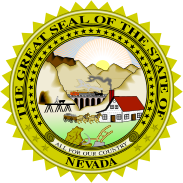Roop County, Nevada
Roop County, until 1862 known as Lake County, was a county of Nevada Territory in the United States from 1861 until 1864. It was created in 1861 as one of the original nine counties of Nevada. In 1864 it was succeeded by Lassen County, California and Washoe County, Nevada.
| Roop County | |||||||||||
|---|---|---|---|---|---|---|---|---|---|---|---|
| County of Nevada Territory | |||||||||||
| 1861–1864 | |||||||||||
| History | |||||||||||
• Established | 1861 | ||||||||||
• Disestablished | 1864 | ||||||||||
| Contained within | |||||||||||
| • Country | |||||||||||
| • Territory | |||||||||||
| |||||||||||
| Today part of | |||||||||||
History
In March 1861, Congress created the official Nevada Territory, with the Honey Lake Valley and the area to its north included within its provisional bounds.[1] When this occurred, the border between Nevada and California was poorly defined in Nevada's Organic Act. Later in 1861, Lake County was established in northwestern Nevada, creating a boundary dispute with California. Its name, was chosen due to the many lakes in the area, including Honey Lake, Pyramid Lake, and Winnemucca Lake.[2] In 1862 it was renamed Roop County after Isaac Roop, governor of the unofficial "Provisional Territorial Government of Nevada Territory," which had previously existed in the same area.[1][3] Much of Roop County, including Susanville (which was named for Roop's daughter), was claimed by California as part of Plumas County.[4] This led to an armed conflict known as the Sagebrush War, the War of Injunctions or the Roop County War.[5]
This resulted in the appointment of a joint California–Nevada boundary survey, with Surveyor-General J.F. Houghton acting for the State of California and Butler Ives, for the Territory of Nevada. The final surveyors report, accepted by California on April 4, 1864, and by Nevada on February 7, 1865, proved that the Honey Lake area and virtually all the population of Roop County was in California. The California portion of Roop County became part of the newly created Lassen County, California, in 1864. The remainder was ceded to Washoe County, Nevada.[6]
See also
- List of former United States counties
- List of Nevada counties
- Nataqua Territory
References
- Davis, William Newell, Jr. (September 1942). "The Territory of Nataqua: an Episode in Pioneer Government East of the Sierra". California Historical Society Quarterly. 1 (3): 225–228. JSTOR 25161008.
- Wren, Thomas (1904). A History of the State of Nevada: Its Resources and People. Lewis publishing Company. p. 102.
- "Creation of Nevada's Counties". Nevada Association of Counties. Archived from the original on February 22, 2012. Retrieved September 25, 2012.
- California v. Nevada, 44 U.S. 125 (Supreme Court of the United States 1980) ("Nevada's Constitution stated that its boundary would proceed "in a North Westerly direction along [the oblique section of the] Eastern boundary line of the State of California to the forty third degree of Longitude West from Washington [and then] North along said forty third degree of West Longitude, and said Eastern boundary line of the State of California to the forty second degree of North Latitude. . . ." Nev.Const., Art. XIV, § 1 (1864). Although it turns out that the 43d degree of longitude west from Washington does not exactly coincide with the 120th meridian west of Greenwich—which was the north-south reference in the California Constitution—the Special Master concluded that the Congress that approved Nevada's Constitution was of the view that the two lines were identical. Certainly the language of the Nevada Constitution supports this conclusion by seeming to equate the 43d degree of longitude west of Washington with the eastern boundary of California.").
- Elliott, Russell R. (1987). History of Nevada. Omaha: U of Nebraska Press. p. 74. ISBN 0-8032-6715-0.
- General history and resources of Washoe County, Nevada, published under the auspices of the Nevada Educational Association. Sagebrush Press, 1969. 1888. p. 20.
